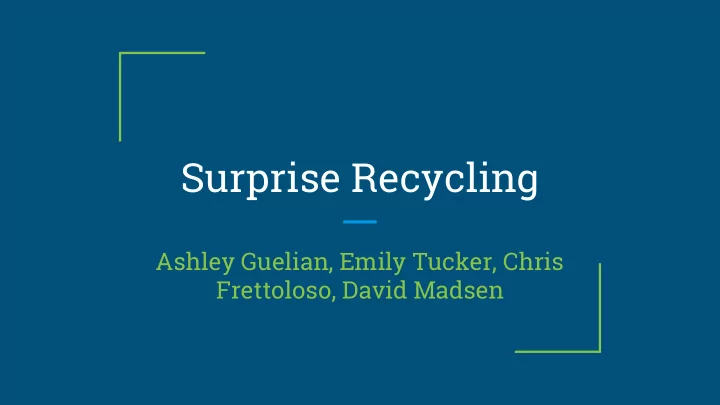

Surprise Recycling Ashley Guelian, Emily Tucker, Chris Frettoloso, David Madsen
What Our Project Is About Community Partners: Waste Management, Surprise Residents ● Sustainability Challenge Area: ● Waste Management & Municipal Recycling Program Objective: Creative strategies to enhance the solid waste/recycling programs to: Increasing waste diversion- (40% in 3-5 Yrs) and recycling tonnages ● ● Reducing recycling contamination rates to under 15%
Research Questions Sources of contamination? ● ● Current educational outreach? ● Is recycling mandatory? What has been learned from talking to the community? ● Servicing company & type of collection (single or dual stream) ● ● Have other municipal programs been researched? ● What has been the outcome of the educational programs implemented?
How has the project progressed?
Overview of the Steps of the Research Project Understand the problem/challenges for ● the City of Surprise Overall objectives- Short Term & Long ● Term Solutions Researched other municipal program ● success
Data Collection Methods of collecting data/research and contacting stakeholders ● Primary: Interview with Christina Betz ○ ● Secondary: ○ Online research Data collected/engagements with stakeholders Information on the recycling contract ● What the education efforts were and how they were implemented ●
Results & Findings Intellectual/Scientific Lessons Learned Education is key ● ● Consistency is needed Recycling is very policy dependent ● ● Difference between single/dual stream Personal/Group Lessons Learned Waste Management/Recycling is a business ● ● Learning from other successes How are these lessons linked with the Key Competencies of Sustainability Recycling is socially, politically and economically driven ●
Proposed Solutions Short term solutions ● Send out emails in addition to the Surprise Progress magazine Partnering with community groups ● Community drop-off events ● ● Incentive and encouragement program- RecycleBank ● EPA’s WasteWise Contamination notification ● Survey ● ● Addressing top contaminants in outreach materials
Proposed Solutions Long term solutions ● Renegotiating contracts with Waste Management Disposal fees to increase diversion ● Implement Zero Waste Program ● ○ Try to create unified efforts with other municipalities Mandatory state recycling policy ●
Current Challenges What do you still need to know or learn in order to do your project? ● Budget limitations with efforts to improve the recycling program? Would the city be willing to implement a zero waste program? ● ● Can we determine the efficacy of education/outreach? What other challenges are you still facing? Recycling not mandatory by the state ● ● Viability of proposed solutions Lack of stakeholder communication from residents ● How can your team, instructors, peers, help you face them. ● Input knowledge of successful programs Policy implementation ●
Sources http://www.fairfaxva.gov/home/showdocument?id=2710 http://archive.epa.gov/region4/rcra/mgtoolkit/web/html/improving.html http://www.theguardian.com/environment/2014/oct/27/how-councils-are-using-clever-and-innovative-ideas-to-increase-recycling-rates http://www.cincinnati-oh.gov/recycling/news/city-outreach-efforts-to-increase-roselawn-recycling-rate/ http://waste-management-world.com/a/how-green-is-mechanical-biological-treatment http://www.solidwaste.com/doc/recycling-incentive-program-proves-popular-0001 Oskamp, S., Burkhardt, R. L., Schultz, P. W., Hurin, S., & Zelezny, L. (1998). Predicting three dimensions of residential curbside recycling: An observational study. The Journal of Environmental Education, 29 (2), 37-42. Dietz, T., Stern, P. C., & ebrary, I. (2002). New tools for environmental protection: Education, information, and voluntary measures . Washington, DC: National Academy Press. Gamba, R. J., & Oskamp, S. (1994). Factors influencing community residents' participation in commingled curbside recycling programs. Environment and Behavior, 26 (5), 587-612. http://www.nrdc.org/cities/recycling/fover.asp
Recommend
More recommend